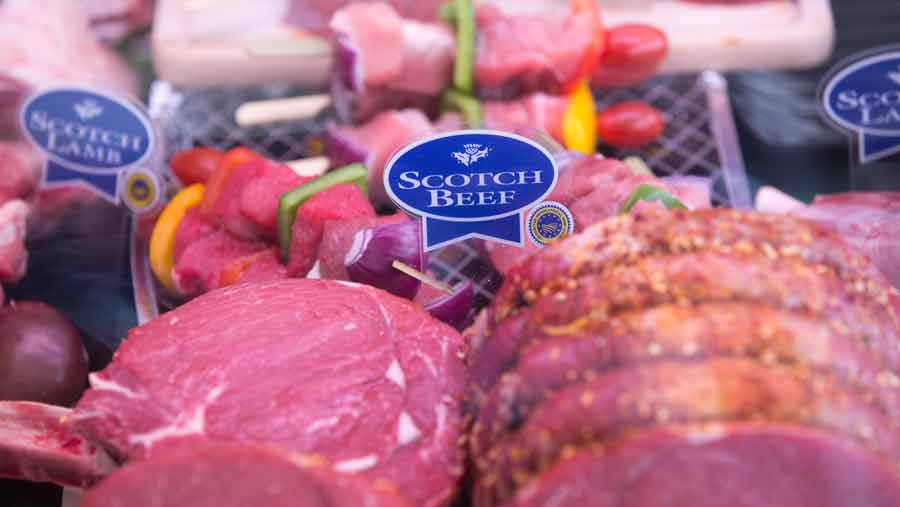NFUS ShelfWatch survey a ‘mixed bag’ for Scots producers
 © Tim Scrivener
© Tim Scrivener Early findings from an NFU Scotland survey of leading supermarkets reveals mixed support for Scottish and British food producers.
NFUS has launched a new round of its ShelfWatch campaign to find out which retailers in Scotland are backing domestic producers.
Over the next 12 months, the union will be working with an independent research firm to provide a snapshot of the extent to which retailers are supporting Scottish and British producers through their sourcing policies.
See also: NFU and NFUS pull support for digital grain passports
The union hopes the results will also provide evidence to support its call to reform labelling rules.
For the first quarterly survey, researchers visited 71 stores across mainland Scotland across two days in late January.
They looked at 10 categories (beef, lamb, pork, chicken, eggs, vegetables and dairy products) on offer in Tesco, Asda, Morrisons, Sainsbury’s, the Co-Op, Marks & Spencer, Lidl and Aldi stores.
In total, more than 15,000 products were audited.
Researchers also reviewed the country of origin of products being offered by the stores’ own brands to identify if they were Scottish, British or imported.
The results show that:
- Asda has the largest percentage of Scottish produce overall (48.7%)
- Sainsbury’s has the lowest percentage of Scottish produce overall (7.6%)
- Three retailers (Asda, Tesco and Sainsbury’s) have less than 10% Scottish products overall.
Speaking at the NFUS annual conference in Glasgow on Thursday (8 February), NFUS chief executive John Davidson told delegates the early findings of ShelfWatch appeared to show fairly strong support for Scottish and British producers – but more had to be done on clearer labelling for consumers.
“The results from the ShelfWatch survey unveil a completely mixed bag of what is going on in shops across the country and available to Scotland’s consumers,” said Mr Davidson.
“While it is encouraging to see that there is strong support for Scottish and UK produce in general and examples of some retailers stocking 100% Scottish, others appear to have absolutely none on their shelves in some sectors.”
He added: “Most of the retailers are regularly 10-15% non-UK. It is fairly positive, but we really need to get behind the data a bit more and take a forensic look at where we are.”
NFUS president Martin Kennedy said the ShelfWatch campaign will run over a year and “will give our consumers a real insight on which retailers are supporting Scottish and British”.
Breaking down the survey results into categories
- Aldi had the largest percentage of pork, bacon and sausages labelled as Scottish. Six retailers had no Scottish labelled pork. Most of the non-Scottish pork was from elsewhere in the UK. Asda (33%) and Tesco (17.3%) are importing fresh pork.
- Aldi, Lidl and Morrisons had more than 70% of Scottish beef. The largest amount of beef in other stores came from elsewhere in the UK. Tesco and Sainsburys had Irish beef, the largest was Sainsburys with 10.4%.
- Lidl had the largest percentage (100%) Scottish lamb followed by M&S with 83.6%. Two retailers (Asda, the Co-Op) had no Scottish lamb. Four retailers, Aldi, Asda, M&S and Tesco, had imported lamb, with 55% of lamb on Asda shelves imported.
- Aldi had the largest percentage (86.7%) of Scottish chicken followed by the Co-Op with 73%. Tesco and Sainsburys, had no Scottish chicken.
- Aldi had the largest percentage (100%) of Scottish eggs, Lidl had 96.4%.
- Aldi had the largest percentage (100%) of Scottish potatoes, Tesco was the lowest with 6.4%.
- Aldi had the largest percentage (61.8%) of Scottish vegetables and Co-Op was lowest at 4.8%.
- M&S had the most Scottish milk (62.4%), Tesco the lowest percentage (30.7%).
